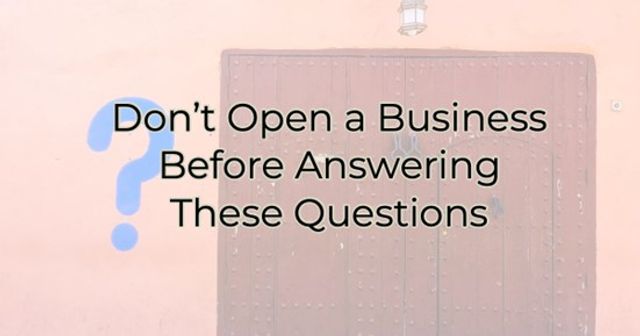Don’t Open a Business Before Answering These Questions
If you're looking to start your own business, answer these questions first. If you're someone who's already started a business, what questions do you wish you had asked before opening?

These days a lot of people are considering business ownership. Whether you buy into a franchise, lease some space and start your own thing, or log onto the internet and begin building an ecommerce website, doing it on your own has never been more alluring. But just because you have an incredible skill or access to cheap goods does not mean you're ready to open the doors to your own business.
Starting a business without a strong foundation can hinder your sales. If you open your doors prematurely, you risk making a bad first impression or targeting the wrong audience. That can be hard to recover from. Before you hang that open sign and put out your welcome mat, ensure you know the answers to the following questions.
What Makes You/Your Business Unique?
Unless you hold the patent to a never-before-seen product, it's likely you're opening a business that already exists. This is not an affront to your abilities or genius. You are probably doing something that is already offered somewhere. If you're fortunate, it doesn't exist in your town or area. But you likely have some sort of competition for what you’re offering to do or sell.
So how do you entice customers to come to your business instead of that of your competitors?
You need to identify and communicate what makes you different. Many people claim their customer service sets them apart. Spend some time watching ads or reading them in your stream on social media. You'll realize that service is not a unique selling point. Everyone thinks they offer it.
Your unique selling point could be your sales environment, a guaranty, a pricing offer (although that’s a slippery slope to underbidding), something about how you perform your service, or what's included with the purchase.
Once you know what makes you unique, you want to create a plan to communicate that to your ideal audience.
Speaking of…
Who Are You Selling To?
If you just answered everyone, you're wasting your time and money. There's at least one group of people—hopefully several—who understand, need, and want what you're selling. Marketing to the rest of the world is a waste of resources. For instance, if you own a yarn store and you market specifically to people who love fabric arts and knitting, you will most likely bring in new customers. However, marketing to those who prefer active, physical hobbies may only get you a handful of clicks on your ads. Those clicks likely will not convert to sales. Focus on those you know you’ll have success with (your target market) before you consider converting others.
What Problems Are You Solving and Are They Worth It?
Most marketing gurus will tell you that you need to focus on a problem and present your business as the solution.
But that advice is only the beginning.
It’s expensive to offer the solution to a problem that most people don't realize they have or the problem doesn't bother them enough to seek a solution for it.
Some entrepreneurs will argue that if you call attention to a problem someone didn't realize they had (and you fix it) they will become loyal customers. But this is a magical equation.
There still must be a need that they feel bothered enough (once they know about it) to seek action on it.
I'm reminded of an episode of Shark Tank where a married couple lamented the problem of strands of her hair sticking to the shower walls (and eventually washing down the drain). To remedy this, they created a shower brush. They used it to brush the hair off the shower walls. The hair then became trapped in the brush’s bristles, and it could be disposed of easily after the shower without clogging the drain.
None of the Sharks invested. Why? The product solved a problem. Sadly, it was a problem no one was inconvenienced enough by to be spurred into action.
Who Is Supporting You?
It's important to answer this question from a financial perspective, but it's more important to think about this from a mental health and business resources perspective. You will be more successful in business if you have support of friends or family or someone within the community who can mentor you and help you with resources. When Jeff Bezos wanted to build a larger bed, his mother didn't stop him. In fact, she took him to the hardware store and helped him get the pieces he needed to create the sleeping area he had dreamed of. She supported his vision when she could have just gone out and bought him a new bed. You need someone like that in your corner when you decide to become a business owner.
In addition to someone who will support your vision, you need someone to help connect you with resources and introduce you to people who can make a difference in your business. Your chamber of commerce is the perfect solution. The chamber offers learning opportunities, networking events, and advocacy for businesses. In your quest to find support, it should be one of your first stops.
Christina R. Metcalf (formerly Green) is a marketer who enjoys using the power of story and refuses to believe meaningful copy can be written by bots. She helps chamber and small business professionals find the right words when they don’t have the time or interest to do so. Christina hates exclamation points and loves road trips. Say hi on Twitter or reach out on Facebook.

Greater Statesville Chamber of Commerce
116 N Center St
Statesville, NC 28677
704-873-2892
www.statesvillechamber.org

